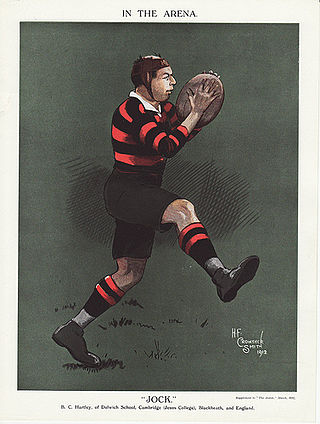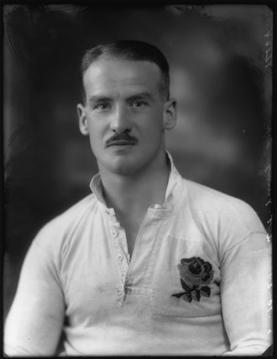
Frederic Hodgson Rudd Alderson was an English international rugby union threequarter who played club rugby for Cambridge University and Hartlepool Rovers. Alderson played international rugby for England and was an original member of invitational team, the Barbarians.
Osbert Gadesden Mackie was an English rugby union centre and Anglican priest. Mackie played club rugby for Wakefield Trinity, and Cambridge University and county rugby for Yorkshire. Mackie played international rugby for the British Isles XV on their 1896 tour of South Africa and on the return from Africa he was awarded two caps for the English team.
Arthur Rotherham was an English rugby union scrum-half who was a member of the first official British Isles tour and was later capped for the England team.
Edward Bromet was an English rugby union forward who was a member of the first official British Isles team to tour abroad. On the tour he was joined by his brother, William Bromet, who would also play international rugby for England.
Randolph Littleton Aston was an English rugby union centre who played club rugby for Blackheath and Cambridge University and was a member of the first official British Isles tour in 1891.
William Grant Mitchell was an English rugby union fullback who was a member of the first official British Isles team. Mitchell represented several club teams and was an original member of touring team, the Barbarians.
Howard Marshall OBE was an English rugby union half-back who played club rugby for Blackheath and Richmond and was a member of the first official British Isles tour in 1891. Marshall played just one game for England, scoring a hat-trick of tries on his debut. It is thought, through historical records and the detective work of Sunderland based sport and social historian Keith Gregson, that Marshall sustained a severe knee injury which curtailed his rugby career.
Denys Douglas Dobson was an English international rugby union forward who played club rugby for Oxford University and Newton Abbot. Dobson played international rugby for England and the British Isles team on its 1904 tour of Australia. Dobson was the first player from a British touring rugby team to be dismissed from the playing field, when he was sent off in a match against the Northern District in Newcastle, New South Wales.
William Henry Thorman was an English rugby union forward who was a member of the British Isles XV that toured South Africa in 1891. Despite playing for Cambridge and the British Isles, Thorman was never awarded a national cap.

Frank Moxon Stout MC also referred to as Frank Moxham Stout, was an English international rugby union forward who played club rugby for Gloucester and Richmond. Stout played international rugby for England and was selected for the British Isles on two tours in 1899 and 1903. On the 1899 tour of Australia, he acted as on field captain for three of the Tests.

Paul Robert Clauss was a German-born rugby union three-quarter who played club rugby for Oxford and Birkenhead Park. Clauss was a member of the first official British Isles tour in 1891 and also represented Scotland on six occasions. He was part of two Triple Crown winning teams for Scotland, and made an impressive international start in the 1891 Championship, scoring in all three Scotland games.
Piercy Henderson "Dolly" Morrison was an English rugby union three-quarter who played club rugby for Northern and Cambridge University and played international rugby for England.

Alexander Findlater Todd was an English rugby union forward who played for Cambridge University and Blackheath F.C. at club level, and Kent at county level. Todd played international rugby for England and later represented the British Isles team on their 1896 tour of South Africa.
William Ernest Bromet was an English rugby union forward who played club rugby for Oxford University and Tadcaster and county rugby for Yorkshire. Bromet and was a member of the first official British Isles tour in 1891 and represented England on twelve occasions between 1891 and 1896. Bromet was a part of the 1892 Triple Crown winning team for England.
Lt. Colonel Gilbert Faraday Collett DSO was an English sportsman who was an international rugby union wing and first-class cricketer for Gloucestershire County Cricket Club. As a rugby footballer he represented Cambridge University and Cheltenham at club level. Collett also played international rugby for the British Isles during the 1903 tour of South Africa but was never selected for the England national team.

Major Bernard Charles "Jock" Hartley OBE was a rugby union international player who represented England from 1901 to 1902. At club level he represented Cambridge University and Blackheath. In 1938 he was given the role of team manager of the British Isles team on their tour of South Africa.
William Eldon Tucker was a Bermudian rugby union player who played club rugby for Cambridge University, St. George's Hospital and Blackheath. Tucker gained his first of five international caps when he was selected for England in 1894. He returned to Bermuda after qualifying as a medical doctor.
Charles Henry "Cherry" Pillman was an English rugby union international who played on 18 occasions for his country and was part of the first official British Isles team that toured South Africa in 1910. He played club rugby with Blackheath and county rugby for Kent. Pillman's speed and tactics made him one of the leading exponents of an attacking wing forward, now recognised as the flanker position.

Maurice Edward Neale was an English rugby union international who played on a single occasion for his country and was part of the first official British Isles team that toured South Africa in 1910, finishing top try scorer of the series.

Arthur Tudor Young was an English rugby union scrum-half who played for both England and the British Lions. At 5 ft 4ins he was affectionately known as England's little man.
 Wales 1905
Wales 1905 South Africa 1903, 1903, 1903
South Africa 1903, 1903, 1903





